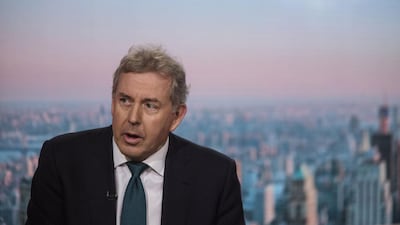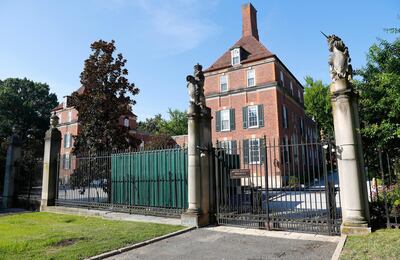This has been a bleak week for those who believe in diplomacy, a troubling week for those who want the strongest possible transatlantic relations, and a challenging week for those who believe in fair play. For those of us who believe in all three, it has been traumatic. The resignation of Sir Kim Darroch, the UK's man in Washington, has sent tremors through the corridors of diplomacy and beyond.
I've known and admired Sir Kim for more than 20 years and watched him in action with prime ministers and presidents of different parties, in Washington, London, European capitals and beyond. His ability to see the funny side of any situation is legendary, although that must have been tested this week. He is one of the top diplomats, not just in the UK but in the world. As the head of the UK Foreign Office put it in his letter of camaraderie, solidarity and regret to Sir Kim: "You are the best of us".
And yet last week ended with the ambassador bullied out of the job he was doing brilliantly, the unfortunate victim of malicious leaks and capricious tweets. It is as though the captain of an opposing sports team was able to sideline one of your best players before the big match. As the dust settles, it is important to ask ourselves how this could have happened and what we must all learn from it.
The story began with the leaking of Sir Kim’s view that the Trump White House was "inept", "uniquely dysfunctional" and "incompetent", a personal and unflinchingly honest analysis that his job required of him, communicated in a series of secret cables and briefing notes. After the leak, British politicians moved fast to apologise for the leak and to distance themselves from the content.

At this point, many of us argued that the situation might have been manageable, a story that would last one news cycle. There had been similiar leaks in the past about presidents George W Bush and Barack Obama, plus an enormous tranche of Wikileaks cables from US ambassadors saying much harsher things about world leaders. A French ambassador had survived in his role, despite tweeting that US President Donald Trump was "a vulture" for using a terrorist attack in Paris to support his restrictions against Muslim visitors. Several of us pointed out that it was Sir Kim’s job as an ambassador to give his government his unvarnished, candid analysis, as diplomats have always done. Privately, those of us who have written more scathing telegrams felt a moment of gratitude that ours remained confidential.
Sadly, we had underestimated this US president’s sensitivity and what one of his defenders cooed was “his love of the counter-punch”. In a series of characteristically bizarre and increasingly unpleasant tweets, he hammered the ambassador personally as a “pompous fool”. He then expanded his targets to take in outgoing British Prime Minister Theresa May – who has had to swallow hard to cultivate a relationship with him – as “foolish”. Sir Kim was promptly disinvited from a White House dinner for the emir of Qatar, barely a month after delivering Mr Trump the state banquet at Buckingham Palace in London that he so craved.
Throughout this sorry saga, Sir Kim himself has behaved with grace, dignity and respect for the channels of diplomacy, despite being frozen out by the US administration. British ambassadors have been attacked in this way by Zimbabwean dictator Robert Mugabe, Syrian President Bashar Al Assad and former Iranian president Mahmoud Ahmadinejad. But this is unprecedented behaviour from a key ally. There was nothing in the diplomat's handbook on how to react. And in behaving the way he has done, the US president has proven his critics right.
The UK, barring a smattering of Trump acolytes, stood behind its ambassador. Some of us reminded Mr Trump that Her Majesty's ambassadors are appointed by the Queen alone. Senior diplomats from other nations protested against the breach of diplomatic courtesy. But as more doors slammed on Sir Kim in Washington, it became clear to him that he could not continue serving the public as needed. The demand to drop the star player having been ignored, the opposing captain had just kneecapped him in the dressing room.
I hope that there are three lessons that can be drawn from this sorry saga. Firstly, that we need to get behind public servants and diplomats, especially at this time of such political flux and international uncertainty. We need them more than ever. The threats in the Straits of Hormuz are just one example of where their work will be essential in the period ahead.
Secondly, that ambassadors should continue to give their capitals their honest assessment. This is where they have always added greatest value. Clearly, systems for transmitting these views have to be more resilient for a digital age when their security will be more vulnerable. But diplomats should not draw the lesson that they need to fall back on vanilla platitudes to be on the safe side.
And thirdly, that the next UK ambassador in Washington – whoever she or he is – will need to be ready to stand up to further bullying. There are big challenges ahead, including a post-Brexit trade deal and significant differences with Mr Trump over climate, race relations, the Middle East, Nato, the UN, Africa and the international system. The security, defence and diplomatic relationship is too important to be subject to the insecurities and Twitter tantrums of the current president. The UK needs to show that it won’t be pushed around and hold firm to its values and interests.
In time, there will be broader questions to consider about ambassadors and social media. I had a bet a few years ago that an ambassador would be fired for a tweet by 2020. As more diplomats start to push the boundaries on social media, the risk increases. The smartphone on which I tweeted as an ambassador was also the device that terrorist groups used to track my movements, so those risks were even clearer to me. But if the debates that matter are taking place on social media then the greater risk is not to be there, too. If they are not to leave the field wide open to extremists, diplomats have no choice but to engage.
Three years ago, I wrote a book exhorting more world leaders to use social media to connect with the public. Despite the events of the past week, I stand by this, although I never anticipated that some world leaders would resort to trolling and abuse of this sort. The leak and the president’s tweets were acts of vandalism against the partnership between the US and the UK and the conventions of diplomacy. It is sad and infuriating that a good man and a great ambassador paid such a high price as a result. But if we learn the right lessons from this unfortunate incident, it will be one more act of honourable public service from a supreme diplomat.
Tom Fletcher is a former UK ambassador and adviser to three prime ministers. He is an adviser at the Emirates Diplomatic Academy, visiting professor at New York University Abu Dhabi and the author of The Naked Diplomat: Power and Politics in the Digital Age



